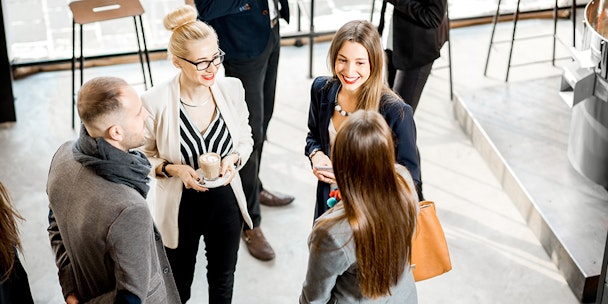Virtual? Hybrid? Why this marketer thinks it’s time to bring back physical events
Virtual events defined the Covid-19 era – but with the threat of Zoom fatigue becoming very real, what will future event strategies look like in 2022 and beyond? Ahead of The Drum Awards for Experience 2021, The Drum caught up with Becky Harmer, head of event marketing LMS EMEA and LATAM at LinkedIn, to find out what she learned from hosting virtual events in 2020/21 and the five-step formula that is central to LinkedIn’s event strategy now and in the future.

Measurement, creativity and meeting event objectives will be key for this year's Experience Awards entries
Rewind to the first virtual event you held since the beginning of the Covid-19 pandemic – how did it go?
We started 2020 with a whole calendar plan – it was going to be an exciting year. And then Covid-19 hit. As lockdowns went on, I naively thought we could transfer all the content we had planned to fit on a virtual platform without having to really change anything. That cookie-cutter way of taking something from a physical to virtual event did not work. We very quickly learned that the audience doesn’t respond in the same way they would physically; they don’t want long-form storytelling.
How has your virtual events strategy developed since then; what learnings did you take from that to implement moving forward?
When we realized that the way we were doing it wasn’t working, we took a break and did some research. We reached out to our suppliers, customers and experts in the industry and global teams around the world to find out what’s working, what’s not working and what we could do better.
Then we were able to build a five-step formula around that:
-
Question if an event is the right thing to do. It is the hardest thing for someone who loves events to say, but could it just be a one-on-one phone call or a Zoom? A roundtable? A blog post? An email? Does it have to be an event? Once we understood that, it cut away a lot of those asks.
-
Plan for change and learn to adapt. In the UK at least, the goalposts kept moving – any hybrid activity we were planning could be canceled at the last minute. So having a plan B, C and D and being ready for anything really did make a difference.
-
Refine your content. We invested heavily in speaker training to ensure that internal and external speakers, although fantastic speakers in the real world, knew how to present virtually to a camera. And beyond that, how to adapt content into short-form storytelling.
-
Make it interactive. We built in interaction beforehand through registration forms and speaker bios to help attendees get to know the speaker – with Spotify lists and book/audio/podcast recommendations. We gave the audience a chance to vote on topics and included live Q&As.
-
Find the fun. We would look for any opportunity to make it creative and bring elements of fun and engagement. From live bands to meditation sessions, and even Mr Motivator popping up during a break to do stretching sessions, it was about anything that we could do to stand out.
Looking ahead, what is your event strategy moving forward?
It’s a big learning curve for everyone. There are lots of benefits to virtual – a wider audience and a real global presence running on multiple time zones. It’s fantastic for education and thought leadership, but not for networking and experiences. People are desperate to get back into the physical world and to physical events because you can’t recreate experiences.
I’m always following that five-step structure to see which format works best for the event objectives. But we need to have back-up plans. It requires a lot of flexibility and that mindset that things are going to keep changing, so be prepared for that.
Why are physical events still so important in our industry?
We’re all human. You can’t get all five senses (see, touch, hear, smell, taste) in a virtual experience. People want to connect with those they haven’t seen. It’s the experience that matters and you can’t replicate that online – at least not yet. Right now, there’s nothing that can compete.
Do you think the past 18 months has changed the future of events and experiences for the better?
There’s greater awareness of the events sector, beyond just the corporate world, as people realize they’re a big part of people’s lives and need to be done in the right way. Event managers and companies have learned new skills and understood the value of measurement beyond ROI. We’ve got even more tools in the toolbox now. It’s important that we don’t lose the skills learned from virtual and hybrid events but there’s still a place for physical. It’s about making sure we’ve got a balance of using these skills for whatever type of event.
For others looking at building their event strategies, what should be on the radar next?
There’s another conversation beyond hybrid and virtual activity that is much bigger – the sustainability piece. Coming off Cop26, a lot of companies are starting to see how they can reduce their carbon footprint in the event sector and readjust what they do and how they do it.
The other thing is technology. I think we’re right at the start of a new era. It will be exciting to see what comes out in the next couple of years, whether it’s artificial intelligence (AI) or virtual reality (VR), holograms or the metaverse. There’s so much already starting to come up, so what happens next and how we use that technology is going to be a fascinating space to watch.
And finally, with LinkedIn being our headline sponsor for The Drum Awards for Experience 2021, what will you be hoping to see from the entries this year?
I personally love seeing anything that’s new and creative where people have taken an idea, even on a smaller budget, and used things in a way I didn’t expect. Beyond that, the measurement is so interesting and how people are looking at success in different ways and how they’ve tailored it for the audience. How they thought about their event objectives and made it work. Those are the three key things: measurement, creativity and meeting those objectives.
Winners of The Drum Awards for Experience will be announced during a virtual awards show on December 7 2021. Click here for more information and to view the shortlist.
Content created with:

LinkedIn is the world's largest professional network with more than 830 million members in more than 200 countries and territories worldwide.
Our vision is...

